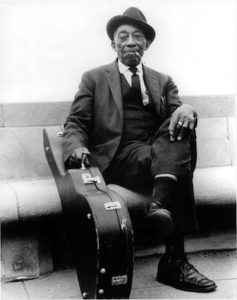
Mississippi John Hurt
*Mississippi John Hurt was born on this date in 1892. He was a Black blues singer.
From Teoc, MS, he grew up in Avalon, Mississippi Hill Country. The population was under 100; it is located north of Greenwood. He began playing guitar at age ten and, within a few years, performed at parties, doing ragtime music in those early days. As a farm hand, he lived in relative isolation, and it was only in 1916 when he went to work briefly for the railroad he broadened his horizons and repertory beyond Avalon. In the early '20s, he teamed up with white fiddle player Willie Narmour, playing square dances.
Hurt was spotted by Tommy Rockwell, a scout for Okeh Records, 1928 and recorded that same year in Memphis and New York. The company was supposed to record Narmour and signed Hurt to record after a quick audition. Of the eight songs Hurt recorded in 1928, only two were released. But then came the Depression, and many were out of work. Hurt went back to herding cows for 35 years until Tom Hoskins, remembering the name of one of the '28 songs, went to Avalon, near Greenwood, and asked for him.
Hurt's dexterity as a guitarist and his plain-spoken nature took away from his following as a popular blues artist at the time. His playing was too soft and articulate, and his voice too plain to be appreciated in a large setting, such as a dance; his music was best heard in small, intimate gatherings. His excellent guitar playing and gentle, home-spun folk style, full of good humor and unlike any other Delta bluesman, brought him three years of stardom at the end of his life. Mississippi John Hurt left behind a legacy unique in the annals of the blues, not just in terms of music. A humble, hard-working man who never sought fame or fortune from his music and conducted his life honestly and honorably, he avoided the troubles that afflicted many of his more tragic fellow musicians.
He felt no bitterness over his late-in-life mass success and, as a result, continued to please and win over new listeners with his recordings until virtually the last weeks of his life. He retired from the music business because of the legal entanglements of his new career. Nothing he ever recorded was less than inspiring, and most of it was superb. Few blues singers presented a gentler, genial image than Mississippi John Hurt. He was a beautiful human being, father, grandfather, church member, and gentleman.
Hurt died of a heart attack on November 2, 1966, in a hospital in Grenada, Mississippi. His last recordings had been done at a hotel in New York City in February and July of that year and were not released until 1972 on the Vanguard LP.